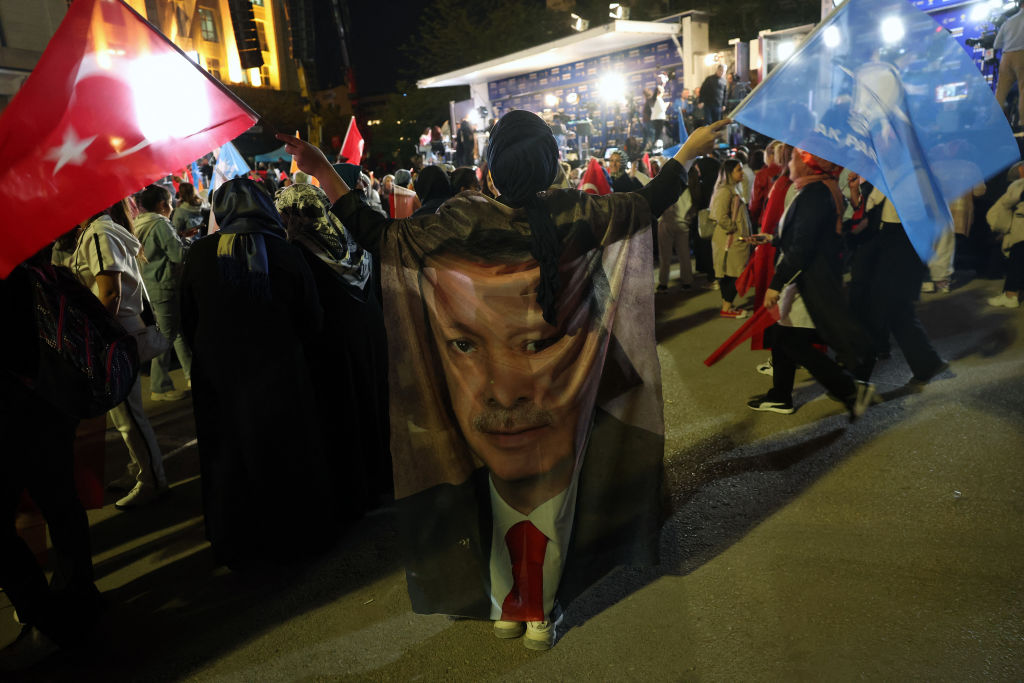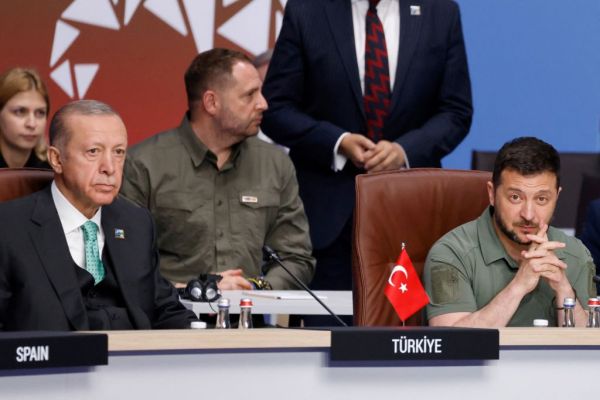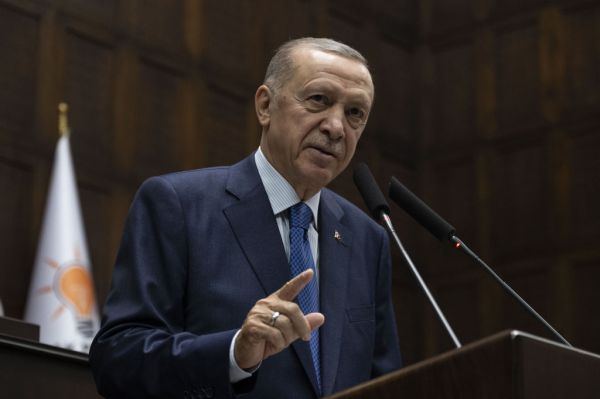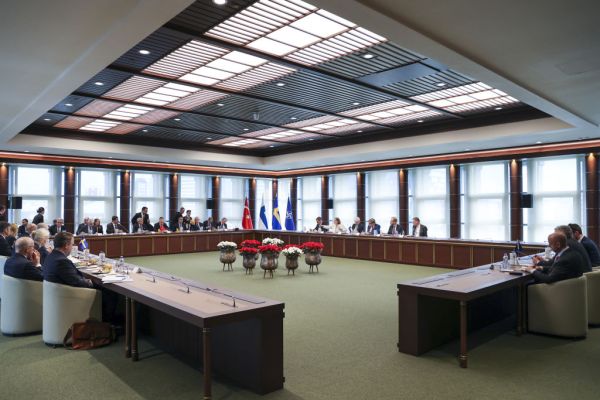ISTANBUL—A weekend that began with cautious optimism soured into quiet disappointment for opponents of Turkish President Recep Tayyip Erdoğan late Sunday night. Defying polls predicting his defeat in the first round of Turkey’s high-stakes presidential election, the incumbent took 49.5 percent of the vote to opposition leader Kemal Kılıçdaroğlu’s 45 percent, triggering a May 28 runoff.
With that, Erdoğan survived the biggest threat to his authority yet. But his rule remains as fragile as ever.
To Turkey’s deeply divided electorate, the runoff will settle the Turkish Republic’s decades-in-the-making identity crisis as it rounds its 100th anniversary this fall. On the ballot: religious conservatism versus secularism, poverty versus prosperity, and autocracy versus democracy. Both sides claim to have the edge going into the second round of voting.
Speaking from the balcony of the Justice and Development Party (AKP) headquarters in Turkey’s capital of Ankara, the usual venue of his victory speeches, Erdoğan stopped short of declaring himself the race’s winner. “Although the exact results are not yet clear, we are in the lead by a long way,” he said. “Turkey once again proved it is among the world’s leading democracies thanks to its adherence to the supremacy of national will.” Below, crowds of devotees waved Turkish flags overlaid with their leader’s face and danced in the streets.
Not far from the celebration, Kılıçdaroğlu sought to assure his own supporters it was premature. “The demand for change in society is over 50 percent,” he said. “For the next 15 days, we will fight for Turkey and our nation to bring rights, law and justice to this country.”
If the election is largely free from intimidation or interference, it could be either side’s game. But that’s a big “if.” As results filtered out on Sunday night, Kılıçdaroğlu’s allies claimed Erdoğan was trying to delay the vote count in opposition strongholds by getting supporters to file objections. They also accused the state-run news agency, Anadolu, of reporting a strong early lead for Erdoğan to demoralize their roughly 300,000 poll monitors across the country.
But even with the possibility of meddling, the election marked the biggest referendum on Erdoğan’s one-man rule to date. During Turkey’s last presidential election in 2018, Erdoğan won in the first round with 53 percent of the vote, beating the second-place candidate by more than 20 points. Kılıçdaroğlu was able to close the gap—and give Erdoğan his only first-round setback thus far—in large part because of his success in pulling together an ideologically diverse coalition of parties, the table of six, which unified around his candidacy.
That alliance was buoyed by the incumbent’s own sinking popularity.
Amid an unprecedented cost-of-living crisis, many former Erdoğan supporters have grown disillusioned with his hold over the Turkish economy. The president—once able to flaunt grand construction projects and Turkey’s flourishing defense industry—has had to repeatedly raise wages, hand out loan forgiveness, and subsidize housing costs this year to offset crippling inflation.
It’s not working. Voters have repeatedly cited the economy, and the corruption they see as driving its downturn, as their No. 1 issue.
“I’m a businessman. Banks don’t give us any credit, any loans, but they give their own people everything,” said Tanıl Kemal, a longtime supporter of Kılıçdaroğlu’s Republican People’s Party (CHP). “I’m not satisfied with those in power because they’re working only for themselves and for their own benefit.”
Such issues are concerning the broader electorate. Erdoğan’s strongest voter base, religious conservatives, has been among the hardest-hit by Turkey’s economic downturn—in no small part because of his party’s pro-natalist policies. Erdoğan has often encouraged Muslim families to have multiple children, chastising women who forgo motherhood as “deficient” and “incomplete.”
“[Erdoğan] told me to have three children. My wife takes care of the children and I work. It is not enough,” said a police officer, speaking under the condition of anonymity and accompanied by his headscarved wife and young children at polls in the conservative Istanbul neighborhood of Üsküdar. “They only give us the right to breastfeed. After that, they pass [responsibility] off. When there is an election, they come and knock on the door. They leave after that and never come back.”
“They exploit us through religion. They talk about our prophets and caliphs, but only they themselves live in the palace,” he added, referring to Erdoğan’s multi-billion dollar presidential complex.
But Erdoğan has managed to shore up another ally in recent years: Turkey’s nationalists. In the lead-up to Sunday, government-controlled television channels and newspapers went after Kılıçdaroğlu for his implicit backing from the pro-Kurdish Peoples’ Democratic Party (HDP), which didn’t run a presidential candidate in the apparent hopes of boosting the opposition’s first-round odds. Erdoğan accuses the party—and by extension, Kılıçdaroğlu and his alliance—of colluding with Kurdish terrorist groups.
Necla Giritli, 68, cast her ballot for Erdoğan for that very reason, saying Kılıçdaroğlu’s party lost her trust when it became clear he’d win the Kurdish vote. “Our soldiers, our men, have died fighting and I want to know why the CHP didn’t think about that—why they supported terrorism.”
Given Kılıçdaroğlu’s first-round success in Kurdish-majority provinces, the government is likely to keep the attacks up. Sinan Oğan, a nationalist politician and the third-place finisher in Sunday’s presidential race, has vowed not to back any candidate that makes concessions to the pro-Kurdish party.
The pro-Erdoğan media also targets nationalist voters by casting Kılıçdaroğlu as in bed with the West. If elected, the opposition alliance has promised to mend Turkey’s ties with its NATO allies, re-up its European Union bid, and reset relations with the U.S. But many voters like the path of “strategic autonomy” the president has taken in recent years, absorbing his hostility toward Western powers into their own worldview in a more personal way. At one polling site in Istanbul, a group of Erdoğan supporters vowed to “vote AKP as long as the foreign media come here.”
While the opposition looks West, Erdoğan has grown increasingly reliant on Russia and China to mitigate Turkey’s economic crisis and fund his reelection. His opponents have even warned of attempted Russian interference, accusing the Kremlin last week of being behind “fabrications, conspiracies, deepfake content” that surfaced ahead of the vote.
In addition to foreign backers, Erdoğan has Turkish institutions on his side. Years of strengthening his grip on government institutions and civil society once again paid off on Election Day: The incumbent was able to “curate the reality for the electorate” and ultimately deliver a competitive race, said Soner Cagaptay, director of the Turkish Research Program at The Washington Institute for Near East Policy. Wielding the power of the judiciary, Erdoğan is able to threaten opposition officials and independent journalists with jail time for sharing unflattering content. Drawing from state coffers, he’s able to dominate the information space.
“If this was a 400-meter relay race, it’s as if Erdoğan ran the last hundred meters and Kılıçdaroğlu ran the entire 400 meters,” Cagaptay added. “He came from behind.”
But Erdoğan’s rigged system may also prove his political undoing, as more and more voters draw the line from one-man rule to bad governance.
“A government devoid of institutions—connected to the health and thoughts of a single person—cannot find a place in this world system, cannot solve economic problems, cannot take any steps forward,” Kurtuluş Sunal, a presumptive CHP candidate for parliament, said from the opposition party’s Istanbul headquarters on Sunday.
This message has resonated from voters of all ages, from college students who cast their first ballot on Sunday to octogenarians who hobbled to the polls.
“I have really great hope,” said Tuğçe Bozalp, a 23-year-old undergraduate. “Since the beginning of my life, I’ve just seen one government and one leader as president.”
“For freedom—I vote for freedom,” said Hanise Tarha, 72, flagging down her young granddaughter to demonstrate the stakes. Erdoğan “destroyed the country.”
“We have no name in this country. We don’t have the right to speak,” said Mine Demir Ayaz, 39, who had just cast her vote to end Erdoğan’s 20-year rule. “A paradise is not promised, but we must at least take a step to close the door of hell.”









Please note that we at The Dispatch hold ourselves, our work, and our commenters to a higher standard than other places on the internet. We welcome comments that foster genuine debate or discussion—including comments critical of us or our work—but responses that include ad hominem attacks on fellow Dispatch members or are intended to stoke fear and anger may be moderated.